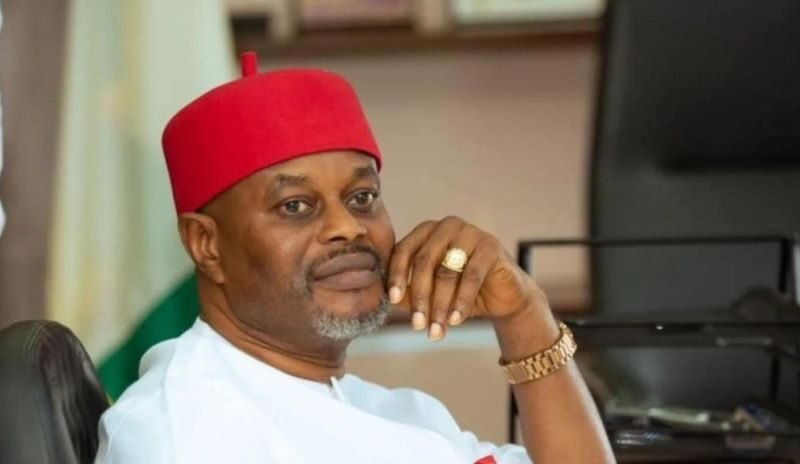MINISTER of Innovation, Science and Technology, Chief Uche Geoffrey Nnaji, is at the center of a storm of controversy following his admission in court documents that the University of Nigeria, Nsukka (UNN), the institution he claimed to have attended never issued him a degree certificate.
This admission comes after a two-year investigative report by Premium Times, which revealed that the university had no record of ever issuing such a certificate to the minister, contradicting the documents he submitted to President Bola Ahmed Tinubu, the Senate, and other federal agencies during his appointment and screening in 2023.
The revelation has triggered widespread outrage, mounting pressure for his resignation, and renewed debate about integrity and accountability in public office.
‘The minister will resign’, a source in the Presidency told News Point Nigeria early Monday morning.
“The President has directed two top security officials and the Secretary to the Government of the Federation to investigate and report to him”, the source stated.
In a court case filed before Justice Hauwa Yilwa of the Federal High Court, Abuja, Minister Nnaji confirmed under oath that the University of Nigeria had not issued him any certificate, a revelation that has since become a major twist in the certificate forgery allegations trailing him.
According to paragraphs 12 and 13 of his 34-paragraph verifying affidavit, Mr. Nnaji admitted that while he was admitted to study Microbiology/Biochemistry in 1981 and claimed to have “completed the programme” in 1985, he never collected any certificate from the university.
“That even though I am yet to collect my certificate from the 3rd Defendant (UNN), due largely to the non-cooperative attitude of the 3rd–5th Defendants (UNN, its Vice-Chancellor, and Registrar)…,” he stated in the affidavit.
The court filing inadvertently confirmed a long-suspected gap: that the certificate Nnaji submitted to multiple Nigerian authorities, including the Presidency, the Senate, and the Office of the Secretary to the Government of the Federation was not issued by UNN.
The embattled minister filed the suit against the Minister of Education, the National Universities Commission (NUC), UNN, and its top officials, seeking to restrain them from “tampering with” or releasing his academic records to the public or the media.
He further sought an order compelling the university to release his academic transcript, and a mandamus compelling the Education Ministry and the NUC to ensure compliance.
However, in her ruling on September 22, 2025, Justice Yilwa granted three of his prayers, acknowledging his interest in the matter but declined to issue any injunctive order restraining the university from releasing his records.
“Having been refused, granting reliefs 1-3 shall not serve as injunctive reliefs against any of the parties,” the judge ruled, effectively turning down the minister’s attempt to gag the institution.
The case was adjourned to Monday (today), October 6 for further hearing.
In a letter dated October 3, 2025, addressed to PREMIUM TIMES and signed by UNN Vice-Chancellor Professor Simon Ortuanya, the university categorically stated that Nnaji did not complete his studies and that there is no record of him graduating from the institution.
“From every available record, we are unable to confirm that Mr. Geoffrey Uchechukwu Nnaji graduated from the University of Nigeria in July 1985. Consequently, the University of Nigeria DID NOT and COULD NOT have issued the purported certificate in July 1985 to Mr. Nnaji,” the letter read.
This followed an earlier communication from the university’s Registrar, Mrs. Celine Nnebedum, who initially confirmed in a December 2023 letter to People’s Gazette that Nnaji graduated in 1985.
However, she later recanted her statement, admitting that no such record existed in the 1985 graduation list.
“It is either some people in the records office were influenced or it was a sincere mistake by the registry,” a senior UNN official told reporters.
The revelation has raised further questions about possible manipulation within the university’s records department, as investigators dig deeper into how the first misleading letter was issued.
During his ministerial screening on August 1, 2023, Nnaji submitted a 10-page profile document with over 100 copies distributed to senators.
In the document, he claimed to hold a Bachelor’s degree in Biochemistry/Microbiology from UNN and attached copies of what appeared to be a degree certificate and an NYSC discharge certificate.
The NYSC document claimed he served at the University of Jos Teaching Hospital in 1985 and later at Jos International Breweries Limited in 1986, a timeline now called into question since his eligibility for NYSC depends on the authenticity of his degree.
Legal scholars and anti-corruption advocates have also weighed in, describing the case as criminal and constitutionally serious.
Professor Ademola Adaranijo, a law expert, urged President Tinubu to suspend Nnaji pending a transparent investigation, saying it was necessary to preserve public trust and institutional integrity.
On his part, Lagos lawyer Barrister Wahab Abdullahi explained that if proven true, Nnaji’s alleged forgery constitutes an offence under Sections 366 and 368 of the Criminal Code Act, punishable by up to 14 years in prison.
“This is not a mere administrative error. It’s a criminal act that violates both the Criminal Code and the 1999 Constitution,” Abdullahi noted.
“It also breaches the Corrupt Practices and Other Related Offences Act of 2000, which prohibits false declarations for undue advantage.”
Similarly, Idowu Phillips, Director of the Public and Private Anti-Corruption Coalition (PPAC), described the allegations as “grave and capable of undermining citizens’ confidence in governance.”
With Nnaji’s own admission that UNN never issued him a certificate, several critical questions remain unanswered:
If UNN did not issue his certificate, where did the one he submitted come from?
How did he qualify for the NYSC programme without a legitimate degree?
Did any Nigerian institution or government office verify his credentials before his appointment?
Why did he attempt to block the release of his academic records through the court?







